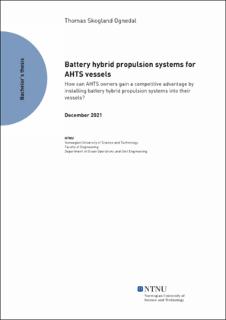| dc.description.abstract | The main purpose of this thesis is to investigate how AHTS owners can gain a competitive advantage by installing battery hybrid propulsion systems into their vessels. Through the three main angles: (i) vessel compatibility, (ii) owners’ perspective, and (iii) charterers ́ commercial gain, the thesis will utilize inductive qualitative methodology to present benefits and challenges related to this transition.
The AHTS market has followed the Norwegian Continental Shelf ́s development since the 70 ́s and has been through both peaks and depressions. The highly advanced and complex AHTS vessels has seen technology developing rapidly. AHTS vessels are some of the most expensive vessels to build and operate. The latest 10 years, owners have been struggling financially due to the 2014 oil price collapse and market downturn. Challenging markets has proved that some owners have lost liquidity and ability to invest in the latest technology. AHTS owners are for that reason, situated at a crossroad where both charterers and governmental instances demand a more environmentally friendly operation. At the same time, finding capital for an investment like this is challenging. A transition like this is crucial for staying competitive in future operation, but with no financing schemes available, the transition is challenging.
Research have been conducted on alternative fuel types such as ammonia and hydrogen, but there are great risk and management challenges involved for a transition like this. The battery hybrid propulsion system has therefore been concluded to be the most suitable solution as of today. Due to the AHTS vessels complex main deck, the battery module is required to be installed below deck. Through the thesis ́ interview with K-Line Offshore, a solution where one of the vessels brine tanks can be sacrificed, proves to be the most applicable solution.
A vessel owners income depends on having their vessels on charter hire. It is for that reason; the charterers need that decide whether a vessel is competitive or not. The thesis provides Lundin Energy Norway ́s Senior Marine Supervisor, Sigmund Hertzbergs, perspective on the matter. Based on their previous vessel selection procedures and the factors Lundin Energy Norway are valuating, AHTS vessels with a battery hybrid propulsion system installed, will gain a competitive advantage. To investigate the charterers commercial gain, the thesis will conduct a consumption analysis. Even though the analysis prove that the systems provide a considerable commercial gain, the thesis enlightens the challenging financial aspect of this transition. | |
